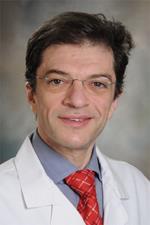
Daniel Kreisel, MD, PhD
G. Alexander Patterson, MD/Mid-America Transplant Endowed Distinguished Chair in Lung Transplantation
Washington University
Lungs are more immunogenic than other organ and tissue grafts. In the clinical setting, combined heart lung transplants have demonstrated the rapid onset of lung rejection. Recent work in our laboratory has demonstrated that lungs provide a suitable environment for the activation of alloreactive T cells. This sets the lung apart from other organs such as the heart, where initiation of an alloimmune response depends on alloantigen presentation within secondary lymphoid organs. In collaboration with Mark Miller, PhD, Department of Pathology & Immunology, Washington University School of Medicine, we have utilized two-photon microscopy to visualize the encounter between donor antigen-presenting cells and recipient-type T cells early after lung engraftment. Moreover, we have shown that unlike the case for heart transplants, lung rejection does not depend on CD4+ T cells. Thus, requirements for lung rejection are less stringent than for other organs. Our laboratory is currently performing mechanistic studies to elucidate the requirements for T cell activation following lung transplantation. We are also interested in developing modulatory strategies to downregulate immune responses to lung grafts.